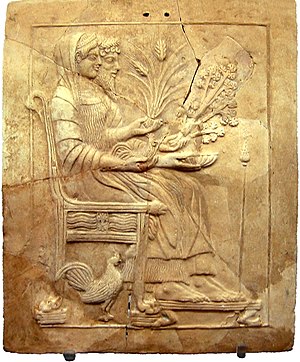It would be way too obvious to go with Morrigan or Brighid (like, duh), so I’m going to choose instead one of my favourite “Descent to the Underworld” goddesses.
The Descent to the Underworld myth has always held special meaning to me, ever since I first read the myth of Persephone and Demeter. I really identified with Persephone, except I was reading a sanitized version of the myth and I was very young so the sexual aspect of Her relationship with Hades did not occur to me, and I related Her trip to the Underworld every year with my trip to my dad’s place for access every summer.
Persephone’s bravery and sacrifice really stuck with me, and now that I have a different understanding of the myth it’s Her sacrifice and liminality that really resonate for me. My current understanding of the myth is that Persephone chooses to give up Her prior life when She eats the pomegranate seeds. It’s my UPG that it would be pretty ridiculous for a goddess to not know the rule of the food of the Underworld — that She knew, and chose to have to return to the Underworld time and again.
She didn’t choose Hades at first, but He didn’t force Her either. I believe (and again, this is all UPG and personal interpretation of a myth — I do not claim that this is correct) He did kidnap Her, but just took Her to the Underworld to show Her a different sort of life. And She chose to live there half the year.
I realize this seems very “white-lighter” and sanitizing of the gods. I’m not trying to sanitize Hades or say that He’s just big fluffy puppy. I’m just saying I don’t think He raped Her. I think that’s part of the myth because the Greeks really liked rape stories. Just saying. The sense I get of Hades is that He’s largely misunderstood.
Anyway, Persephone still remains a favourite of mine. She walks the edge between Dark and Light, Under and Overworld, Summer and Winter, and so can see both sides of the story. She is Queen of the Dead but also Queen of Summer.

I have much the same opinion, Katje. And, y’know, rape wasn’t just what we think of now as rape- any sexual activity without the father’s consent was rape. So she could have been entirely willing.
I have always thought that yes, he kidnapped her, but primarily because there was no other way to get to her, as Demeter was such a smothering, overwhelming influence. And when Persephone finally had a chance to breathe and think and make a decision for herself, she knew she wanted a life of her own- a role of her own.
*any sexual activity without the father’s consent was rape. *
A pertinent point that I’d totally forgotten about in writing this post — thank you for the reminder. 🙂
(There was a really great burlesque show that I watched last fall called “GREECE!” and it was a retelling of this particular myth using the songs from Grease. It showed Persephone making the choice, and Hades being a hopeless romantic. Despite their portrayal of Hecate, I quite enjoyed it, as it fit with my UPG.)
Anyway, glad to see I’m not alone in this opinion. 🙂
I seem to recall Dver @ A Forest Door mentioning that Persephone’s descent might have actually aligned with the Greek summer, because it was very hot and barren, and nothing could really grow. It’s not as common (or as visceral) as winter-barrenness, especially for those of us who live in a climate where summer time is not barren, but fruitful.
Interesting. That definitely makes sense, considering the Mediterranean climate. 🙂
I kinda like this interpretation of it actually. I think you raise a very valid point that (in my limited experience) hasn’t really been brought up before; that she knew the rules of the game and ate those seeds on purpose.
I also really liked this story when I was younger, but it was with Demeter that I aligned myself with. I guess I found it comforting that as a mother, She would do whatever it took to have Her daughter restored to Her, even if it was for only half the year.